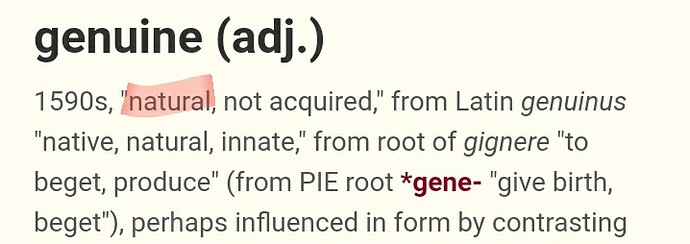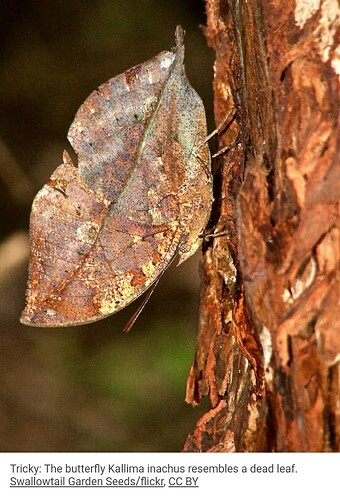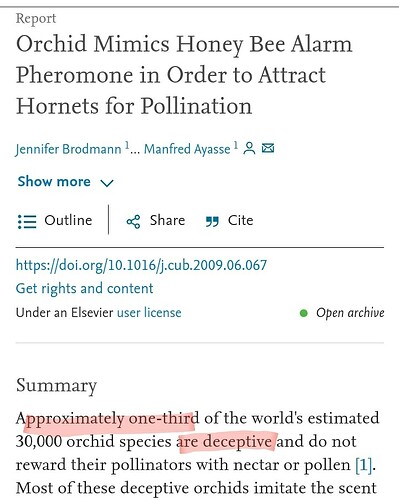“You” are everything that nature orchestrated you to be, are you not (shame included)? “You” are perfectly natural. Perfectly organic. Perfectly … genuine.
Everything you feel is perfectly natural and therefore perfectly genuine. How can that which is natural not be genuine?
Richard (2002): The affective feelings are most certainly natural – as is the hot-blooded killing of one’s fellow human being – so much so that I make no secret of the fact that what I am reporting is indeed unnatural.
Mailing List 'B' Respondent No. 12
Richard (2004): It is natural, for example, to injure, maim, or kill one’s fellow human being in a fit of anger.
Mailing List 'AF' Respondent No. 64
If anything, the condition of actual freedom is unnatural. Of course it’s really not, actually. Nothing that occurs in nature is unnatural. It’s all natural. It’s all genuine.
Now, if you wish to be in agreement with Richard, then you must maintain that shame is unnatural (aka artifical) while “your” passions are natural (aka genuine).
Now, if “your” passions are natural, what does that make “you”?
[2001]
RESPONDENT: Many feelings as shame are triggered off by thought when remembering past lived experiences stored as memory and the thinker lives them anew, giving rise to the feeling of shame anew, so that the rising of the sensation of discomfort called ‘shame’ seems to be just a process dependent of the thinker and of memory. The instinctive bodily sensation named ‘shame’ seems to be a natural reaction when the thinker is making a situation of insecurity through his interpretations. In this way, it seems that thought as thinker is not the primordial creator of instinctive bodily sensations, but also there’s not the rising of the instinctive discomfort named as ‘shame’ without the action of the thinker.
RICHARD: Indeed it is so that ‘thought as thinker is not the primordial creator of instinctive bodily sensations’ if by ‘bodily sensations’ you mean bodily feelings (affective feelings) … and there is no ‘natural reaction’ called ‘shame’. Shame, and all its variations (such as embarrassment, humiliation, mortification, disgrace, dishonour, ignominy,) are cultivated feelings, socialised feelings, cultural feelings.
Speaking personally, I have no shame whatsoever (hence no pride nor its antidotal humility).
RESPONDENT: So that thought as thinker is not the primordial creator of bodily sensations but the thinker is what can trigger off them, what can create a response of fear or sorrow when it is indeed unnecessary.
RICHARD: It is emotional memory … a non-verbal memory located in what is popularly called the ‘lizard brain’ or ‘reptilian brain’ at the top of the brain-stem/ base of the skull.
RESPONDENT: This points me that the instinctive bodily responses and sensations can exists by themselves without a so called ‘feeler’ at their root, they are an essence of the body, they seem to be natural and it is not necessary to extinct them, it seems only necessary to extinct the thinker, who makes false interpretations of reality and creates unnecessary situations of insecurity and threat, triggering off then these prior existing bodily responses and sensations. Do you consider the above correct? If not, why?
RICHARD: No, because they not only ‘seem to be natural’ … they are indeed natural. It is natural to feel fear and aggression and nature and desire … these feelings are blind nature’s instinctual survival passions. However, now that a thinking, reflective brain has developed sensible thought, thoughts and thinking these instinctual survival passions can be safely eliminated.
In fact, what was once essential for survival is nowadays the biggest threat to survival.
Mailing List 'B' Respondent No. 45
The positions to consider from the above quote are the following:
- Shame is not natural.
- Fear and aggression and nurture and desire are natural.
One item is regarded as a product of human cultivation, the other is regarded as innate and “bodily.”
Polystyrene cups are also a product of human cultivation. Does that likewise make them unnatural?
Is that which is artificial (“man-made”) truly unnatural? Is that which is unnatural truly not genuine (aka a fraud, a fake)?



